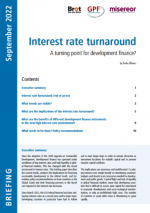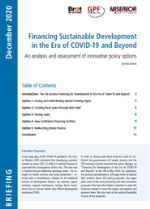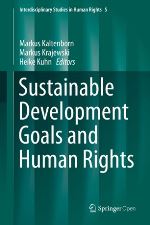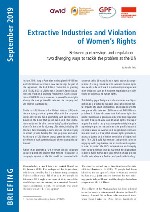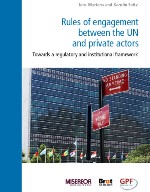Germany
Published on Thu, 2022-09-15 19:54
Since the adoption of the 2030 Agenda on Sustainable Development, development finance has operated under conditions of low interest rates and high liquidity in global financial markets. This has changed with the recent turnaround in interest rates. The briefing paper Interest rate turnaround. A turning point for development finance? by Bodo Ellmers, describes the current trends, analyzes the implications for financing sustainable development in the Global South, and formulates policy recommendations on how countries in the Global South and their financing partners in the North can respond to the interest rate increases. |
Published on Wed, 2020-12-09 13:35
An analysis and assessment of innovative policy options In the early days of the COVID-19 pandemic, the United Nations (UN) estimated that developing countries needed an extra US$ 2.5 trillion in external finance to cope with the consequences of the crisis. This vast sum is needed because additional spending needs – for example on health services and social protection – coincide with a simultaneous collapse of all traditional sources of development finance: tax revenue, export earnings, migrant remittances, foreign direct investment and, to a lesser extent, also official development assistance (ODA). In order to discuss how these finances could be mobilized, the governments of Canada, Jamaica and the UN Secretary-General launched the policy dialogue on “Financing for Development in the Era of COVID-19 and Beyond” at the UN in May 2020. |
Published on Thu, 2020-08-27 14:21
A snapshot of the ongoing work at the United Nations in times of crisis This briefing paper looks at the financing for development (FfD) work at the United Nations in 2020, an exceptional year due to outbreak of the global coronavirus crisis in the spring. Following this shock, FfD became a highly relevant issue on the UN agenda. The FfD process as originally scheduled was redesigned, with the FfD Forum originally scheduled for April cut down from four days of face-to-face meetings to a virtual session that lasted for just one hour. An official outcome document was adopted anyway, however free of concrete commitments that would match the needs of coping with the crisis. |
Published on Mon, 2020-02-10 08:31
In the 2030 Agenda governments committed to a revitalized Global Partnership between States and declared that public finance has to play a vital role in achieving the Sustainable Development Goals (SDGs). But in recent decades, the combination of neoliberal ideology, corporate lobbying, business-friendly fiscal policies, tax avoidance and tax evasion has led to a massive weakening of the public sector and its ability to provide essential goods and services and to fulfill its human rights obligations. Public-private partnerships (PPPs) are promoted as the most efficient way to provide the necessary means for implementing the SDGs, but many studies have shown that privatization and PPPs involve disproportionate risks and costs for the public sector and can even exacerbate inequalities, decrease equitable access to essential services and jeopardize the fulfilment of human rights. An analysis by Jens Martens, from Global Policy Forum. |
Published on Fri, 2019-10-25 08:29
Between partnerships and regulation – two diverging ways to tackle the problem at the UN The new briefing paper “Extractive Industries and Women’s Rights: Between partnerships and regulation – two diverging ways to tackle the problem at the UN”, by Karolin Seitz and published by AWID, DAWN, Global Policy Forum and Rosa-Luxemburg-Stiftung, presents how women are disproportionately affected by negative social and environmental impacts of extractive industries. The briefing also explains why a new partnership between UN Women and BHP Billiton, launched in June 2018, is very problematic. Similar to UN Women, other United Nations (UN) entities are trying to attract partnerships with the corporate sector. As the case of UN Women shows, potential risks and side-effects of such partnerships are often not properly addressed. |
Published on Mon, 2019-10-07 11:29
Global multi-stakeholder partnerships and initiatives between public and private actors, which move beyond traditional nation-state multilateralism, are now perceived as the future of international cooperation. The UN is already involved in hundreds of partnership initiatives with individual companies and business associations. ‘Rules of engagement between the UN and private actors,’ a paper by Jens Martens and Karolin Seit from Global Policy Forum, demonstrates that the existing guidelines are weak and highly heterogeneous. Effective and comprehensive rules for such cooperation are still missing. The non-regulated engagement between the UN and the private sector could result in a loss of reputation, increased influence by private actors on political decision-making, and could divert scarce public resources away from UN goals. |
SUSCRIBE TO OUR NEWSLETTER

